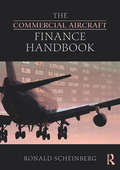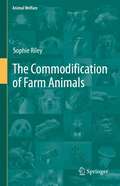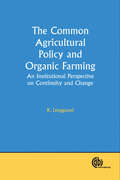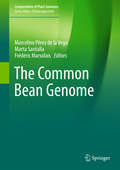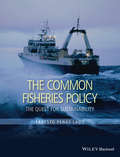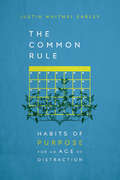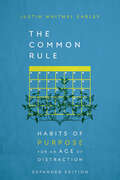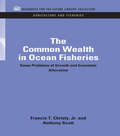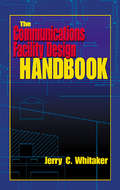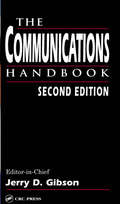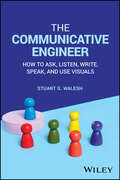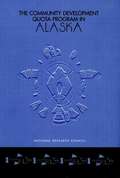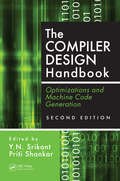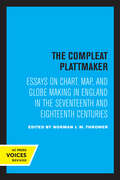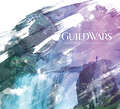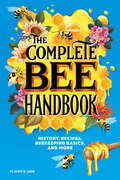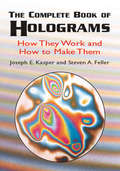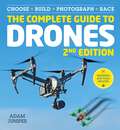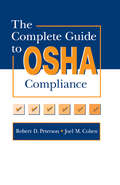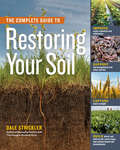- Table View
- List View
The Commercial Aircraft Finance Handbook
by Ronald ScheinbergThe Commercial Aircraft Finance Handbook is a resource for every type of aircraft finance practitioner - seasoned and starter alike. The handbook offers a comprehensive overview of the multifaceted matters that arise in the process of financing commercial aircraft. The book clearly reviews the different topics on a high-level basis, and then explains the terminology used for each particular area of specialization.. It can be used as both a learning aid and reference resource. The area of commercial aircraft finance is multidisciplinary one, touching professionals across law, finance, insurance, and leasing (to name a few) and this book arms these diverse practitioners with a framework for knowing the questions and issues that should be considered in an aircraft financing transaction. This book will also provide practitioners just starting out in this field with an introduction to the myriad of topics in aircraft finance while providing more seasoned professionals with explanations of matters outside their normal area of expertise. As well, all practitioners will benefit from the resources provided in the appendices.
The Commodification of Farm Animals (Animal Welfare #21)
by Sophie RileyThis book examines how the developments in veterinary science, philosophy, economics and law converged during the nineteenth and early twentieth centuries to entrench farm animals along a commodification pathway. It covers two neglected areas of study; the importance of international veterinary conferences to domestic regimes and the influence of early global treaties that dealt with animal health on domestic quarantine measures. The author concludes by arguing that society needs to reconsider its understanding and the place of the welfare paradigm in animal production systems. As it presently stands, this paradigm can be used to justify almost any self-serving reason to abrogate ethical principles.The topic of this book will appeal to a wide readership; not only scholars, students and educators but also people involved in animal production, interested parties and experts in the animal welfare and animal rights sector, as well as policy-makers and regulators, who will find this work informative and thought-provoking.
The Common Agriculture Policy and Organic Farming
by K. LynggaardThe Common Agricultural Policy and Organic Farming covers how ideational change came about to enhance the understanding of change within the Common Agricultural Policy (CAP) and to plan and implement change in European agriculture policy.
The Common Bean Genome
by Marcelino Pérez de la Vega Marta Santalla Frédéric MarsolaisThis book provides insights into the genetics and the latest advances in genomics research on the common bean, offering a timely overview of topics that are pertinent for future developments in legume genomics. The common bean (Phaseolus vulgaris L.) is the most important grain legume crop for food consumption worldwide, as well as a model for legume research, and the availability of the genome sequence has completely changed the paradigm of the ongoing research on the species. Key topics covered include the numerous genetic and genomic resources, available tools, the identified genes and quantitative trait locus (QTL) identified, and there is a particular emphasis on domestication. It is a valuable resource for students and researchers interested in the genetics and genomics of the common bean and legumes in general.
The Common Fisheries Policy
by Ernesto Penas LadoWritten by Ernesto Penas of the European Commission's Directorate-General for Maritime Affairs and Fisheries, this thorough and comprehensive book provides a full understanding of the European Commission's common fisheries policy (CFP), which is of major importance to all fisheries scientists and managers. Commencing with introductory chapters which look at the history behind the CFP, its birth and enlargement, this excellent book continues with chapters covering the major aspects of the CFP including policies on conservation, fishing fleets, structure, control, and environment, the external sector, scientific advice, stakeholders and decision making. Further chapters consider the Mediterranean Sea, aquaculture and the reforms of the CFP. A concluding chapter looks at what's next for the CFP. The Common Fisheries Policy is an essential reference for all fisheries managers and fisheries scientists throughout the world, and provides a huge wealth of important information for fish biologists, conservation biologists, marine biologists, environmental scientists and ecologists in academia, governmental and non-governmental organizations and commercial operations. Libraries in all universities and research establishments where fisheries and/or biological sciences are studied and taught should have copies on their shelves.
The Common Rule: Habits of Purpose for an Age of Distraction
by Justin Whitmel EarleyHabits form us more than we form them. The modern world is a machine of a thousand invisible habits, forming us into anxious, busy, and depressed people. We yearn for the freedom and peace of the gospel, but remain addicted to our technology, shackled by our screens, and exhausted by our routines. But because our habits are the water we swim in, they are almost invisible to us. What can we do about it? The answer to our contemporary chaos is to practice a rule of life that aligns our habits to our beliefs. The Common Rule offers four daily and four weekly habits, designed to help us create new routines and transform frazzled days into lives of love for God and neighbor. Justin Earley provides concrete, doable practices, such as a daily hour of phoneless presence or a weekly conversation with a friend. These habits are “common” not only because they are ordinary, but also because they can be practiced in community. They have been lived out by people across all walks of life—businesspeople, professionals, parents, students, retirees—who have discovered new hope and purpose. As you embark on these life-giving practices, you will find the freedom and rest for your soul that comes from aligning belief in Jesus with the practices of Jesus.
The Common Rule: Habits of Purpose for an Age of Distraction
by Justin Whitmel EarleyHabits form us more than we form them. The modern world is a machine of invisible habits, forming us into anxious, busy people. We yearn for the freedom of the gospel but remain shackled by our screens and exhausted by our routines. The answer is a rule of life that aligns our habits to our beliefs. The Common Rule's four daily and four weekly habits transform frazzled days into lives of love for God and neighbor. Justin Earley provides doable, life-giving practices to find freedom and rest for your soul. This expanded edition now includes study guide questions for individual reflection and group discussion.
The Common Wealth in Ocean Fisheries: Some Problems of Growth and Economic Allocation (RFF Agriculture and Fisheries Set)
by Anthony Scott Francis T. ChristyBy examining international fishery resources from a primarily economic and political viewpoint, this book highlights the common property aspects of fisheries, physical productivity of the ocean, supply and demand, and the legal and institutional framework within which the fisheries industry operates. Originally published in 1966
The Communications Facility Design Handbook (Electronics Handbook Series)
by Jerry C. WhitakerThe responsibilities of the system engineer are many and varied, especially as they relate to facility design and construction. Successful execution of these responsibilities requires an understanding of the underlying technologies, the applicable quality standards, and the proper methods for achieving them. The Communications Facility Design Handbook is dedicated to providing and supporting that understanding. It examines the tasks and functions of the system engineer and establishes a foundation for designing, installing, operating, and maintaining audio, video, computer, and radio frequency systems and facilities.Unique in its scope and its approach, The Communications Facility Design Handbook describes the important steps required to take a project from basic design to installation and completion. From the fundamental principles of electronics to details on wiring, from budget analysis to safety considerations, this is your one-stop reference for planning, building, renovating, and operating all types of electronics facilities.
The Communications Handbook
by Jerry D. GibsonFor more than six years, The Communications Handbook stood as the definitive, one-stop reference for the entire field. With new chapters and extensive revisions that reflect recent technological advances, the second edition is now poised to take its place on the desks of engineers, researchers, and students around the world.From fundamental theory to state-of-the-art applications, The Communications Handbook covers more areas of specialty with greater depth that any other handbook available. Telephony Communication networks Optical communications Satellite communications Wireless communications Source compression Data recording Expertly written, skillfully presented, and masterfully compiled, The Communications Handbook provides a perfect balance of essential information, background material, technical details, and international telecommunications standards. Whether you design, implement, buy, or sell communications systems, components, or services, you'll find this to be the one resource you can turn to for fast, reliable, answers.
The Communicative Engineer: How to Ask, Listen, Write, Speak, and Use Visuals
by Stuart G. WaleshTHE COMMUNICATIVE ENGINEER Application-oriented communication guidebook designed for engineering students and practitioners to improve their asking, listening, writing, speaking, and use of visuals Practicing engineers spend about half their time communicating ideas, facts, and feelings but invest only a small part of their formal education learning how to communicate. The Communicative Engineer addresses this gap. When used as a textbook for students or resource for practitioners, this book shows engineers in all disciplines how to use five communication modes—asking, listening, writing, speaking, and visuals—to participate in or lead successful engineering projects and achieve professional success and significance. Written by a highly qualified author with six decades of relevant experience, The Communicative Engineer: Illustrates, using examples, the benefits of communication knowledge, skills, and attitudes (KSA) and the costs of poor communicationPresents communication fundamentals and goes well beyond theory by illustrating numerous applicationsDescribes the five modes of communication, including their pros and cons, and offers detailed advice on when and how to use themPrepares readers to use or participate in various communication forms such as interviews, letters, meeting minutes, memoranda, oral examinations, proposals, question and answer sessions, reports, resumes, speeches, and texts Profiles excellent engineer communicators to serve as exemplars and references memorable speeches from within and outside of engineering to provide examplesProvides thorough documentation of content for readers who want to dig deeper into selective aspects of communication Supplementing the scientific and technical education of engineers, The Communicative Engineer offers engineering students and practitioners in all disciplines the parallel communication KSA needed to fully realize their potential. Given technology’s ever-increasing role in society, the communicative engineer will be prepared to fill leadership roles.
The Community Development Quota Program in Alaska
by Committee to Review the Community Development Quota ProgramThis book reviews the performance and effectiveness of the Community Development Quotas (CDQ) programs that were formed as a result of the Sustainable Fisheries Act of 1996. The CDQ program is a method of allocating access to fisheries to eligible communities with the intent of promoting local social and economic conditions through participation in fishing-related activities. The book looks at those Alaskan fisheries that have experience with CDQs, such as halibut, pollock, sablefish, and crab, and comments on the extent to which the programs have met their objectives--helping communities develop ongoing commercial fishing and processing activities, creating employment opportunities, and providing capital for investment in fishing, processing, and support projects such as infrastructure. It also considers how CDQ-type programs might apply in the Western Pacific.
The Compiler Design Handbook: Optimizations and Machine Code Generation, Second Edition
by Priti Shankar Y. N. SrikantToday’s embedded devices and sensor networks are becoming more and more sophisticated, requiring more efficient and highly flexible compilers. Engineers are discovering that many of the compilers in use today are ill-suited to meet the demands of more advanced computer architectures.Updated to include the latest techniques, The Compiler Design Handbook, Second Edition offers a unique opportunity for designers and researchers to update their knowledge, refine their skills, and prepare for emerging innovations. The completely revised handbook includes 14 new chapters addressing topics such as worst case execution time estimation, garbage collection, and energy aware compilation. The editors take special care to consider the growing proliferation of embedded devices, as well as the need for efficient techniques to debug faulty code. New contributors provide additional insight to chapters on register allocation, software pipelining, instruction scheduling, and type systems. Written by top researchers and designers from around the world, The Compiler Design Handbook, Second Edition gives designers the opportunity to incorporate and develop innovative techniques for optimization and code generation.
The Compleat Plattmaker: Essays on Chart, Map, and Globe Making in England in the Seventeenth and Eighteenth Centuries
by Norman J. W. ThrowerThis title is part of UC Press's Voices Revived program, which commemorates University of California Press’s mission to seek out and cultivate the brightest minds and give them voice, reach, and impact. Drawing on a backlist dating to 1893, Voices Revived makes high-quality, peer-reviewed scholarship accessible once again using print-on-demand technology. This title was originally published in 1978.
The Complete Art of Guild Wars: ArenaNet 20th Anniversary Edition
by Arenanet Indigo BoockA glorious, full-color tome that includes art and commentary chronicling the ongoing development of the Guild Wars universe.Explore the living history of Tyria through an expansive collection of never-before-seen concept art, production material, and creator commentary from Guild Wars and Guild Wars 2 that offers exclusive insight into an every-changing world inhabited by millions of players! The continuing growth of the Guild Wars franchise is lovingly detailed by the ArenaNet artists themselves in a volume that commemorates the studio's twentieth anniversary. Dark Horse Books and ArenaNet invite all asura, sylvari, norn, char, and humans to add this wonderful art book as a centerpiece to their collections!
The Complete Bee Handbook: History, Recipes, Beekeeping Basics, and More
by Dr. Dewey M. CaronA guide to the history, behavior, and bounty of the humble bee From backyard keeping to bee-centric foods and home goods, there's no end to humankind's fascination with bees. The Complete Bee Handbook is a compelling read and easy-to-use reference, packed with practical and thought-provoking information for bee lovers new and old. Journey through the past, present, and future of the bee, including their evolution, their ever-critical role as pollinators, and the ongoing threats that jeopardize their survival. You'll also discover a short and sweet cultural history of beekeeping, the numerous applications of bee products, and tips on how you can support your local bee population. This bee guide explores: The life of the honey bee—Look into the mind of the hive as you learn about the role each bee plays in helping their colony function and thrive. Beekeeping for beginners—Get simple advice for cultivating a bee-friendly garden, from preferred plants to fun DIY accessories. Buzzworthy recipes—Try your hand at creative recipes for bee lovers, including mead, baklava, beeswax soap, and candles. Discover everything you wanted to know about bees with The Complete Bee Handbook!
The Complete Book of Holograms: How They Work and How to Make Them
by Joseph E. Kasper Steven A. Feller"I predict that Kasper and Feller will become a standard reference on holography for students and interested laymen." -- James A. Van Allen.For most nonscientists, holograms are an intriguing -- if not mesmerizing -- mystery. How are these seemingly magical images created and what makes them appear to be three-dimensional? This fascinating book not only offers the answers to these and other questions about holography -- it even gives step-by-step instructions so that readers can manufacture their own holograms.Written in a lively, stimulating style, The Complete Book of Holograms provides a thorough, easy-to-understand explanation of the theory and science of making holograms. The physical basis of holography is introduced through a discussion of interference patterns in water waves and in light waves. Without complicated mathematics or physics, the authors explain the two models of holography -- the geometric and the more complex zone-plate model -- and the several different types of holograms, including transmission, reflection, phase, projection, rainbow, multiplex, and others. They explain how to copy holograms; describe special techniques and applications; and discuss potential uses for holography, including the use of holograms in movies, television, and data storage. They also present some basic setups for making holograms and show readers how to create their own -- using little more than simple photographic equipment and an inexpensive laser. Two appendixes give advice on laser safety and list sources of material and further information.
The Complete Book of the SR-71 Blackbird: The Illustrated Profile of Every Aircraft, Crew, and Breakthrough of the World's Fastest Stealth Jet
by Richard H. GrahamThe ultimate guide to the history, development, manufacture, modification, and active service of all fifty models in the SR-71 program.At the height of the Cold War in 1964, President Johnson announced a new aircraft dedicated to strategic reconnaissance. The Lockheed SR-71 Blackbird spy plane flew more than three-and-a-half times the speed of sound—so fast that no other aircraft could catch it. Above 80,000 feet, its pilots had to wear full-pressure flight suits similar to what was used aboard the space shuttle.Developed by the renowned Lockheed Skunk Works, the SR-71 was an awesome aircraft in every respect. It was withdrawn from use in 1998, when it was superseded by satellite technology. Twelve of the thirty-two aircraft were destroyed in accidents, but none were ever lost to enemy action.Throughout its thirty-four-year career, the SR-71 was the world’s fastest and highest-flying operational manned aircraft. It set world records for altitude and speed: an absolute altitude record of 85,069 feet and an absolute speed record of 2,193.2 miles per hour.The Complete Book of the SR-71 Blackbird covers every aspect of the SR-71’s development, manufacture, modification, and active service from the insider’s perspective of one of its pilots and is lavishly illustrated with more than 400 photos. Former pilot and author Richard Graham also examines each of the fifty planes that came out the SR-71 program (fifteen A-12s; three YF-12s; and thirty-two SR-71s) and tells each plane’s history, its unique specifications, and where each currently resides.
The Complete Guide to Contracting Your Home: A Step-by-Step Method for Managing Home Construction
by Kent Lester Dave McguertySave 30% on home construction! Whether you want to take on all the responsibility of contracting your home or simply want to intelligently communicate with your homebuilder, The Complete Guide to Contracting Your Home can help you save 30% or more on the cost of home construction by teaching you the ins and outs of managing your construction project. Learn how to get your project off to a solid start. Get financial and legal details in language you can understand. Learn what to consider when selecting a lot and how to deal with suppliers, labor and subcontractors. Gain understanding of building codes and inspections so you can manage with authority, confidence, and efficiency. This extensive guide walks you through each phase of construction including preconstruction, foundations, framing, roofing, plumbing, electrical, masonry, siding, insulation, drywall, trim, painting, cabinetry, countertops, flooring, tile and landscaping. Completely revised and updated, this edition includes a new section on sustainable building as well as the most comprehensive building resources section ever compiled. You'll find schedules, order forms, control logs, contracts and checklists to help keep your project on track.
The Complete Guide to Drones Extended 2nd Edition
by Adam JuniperIf you think you need a boarding pass to fly, you're really missing out... Today, drones are everywhere. From film studios to farms, they're in the hands of photographers, commercial surveyors and racers alike. This fully illustrated book explains how drones developed, where they're going and which one you should choose. It even includes complete instructions to build both a simple drone and a super-fast FPV racer yourself.Whether you're flying indoors or out, buying or building, this book covers everything:¦ Understand the Jargon Flying has a lot of unfamiliar terminology, but this book will make it easy to master.¦ Business or Pleasure Every type of multicopter you might want is introduced, including explanations of which is best suited for what role.¦ Get the Best Pictures This edition includes an extended guide to the tech and composition tricks you can use to make your pictures stand out of the pack.¦ Get the Best Video A new shot-guide shows you how to get the most engaging aerial video, whatever your drone.¦ Be a Winning FPV Racer There are two complete step-by-step instructions for building your own drones inside: an FPV racer, or a surprisingly cheap wooden drone - both great projects.Following the worldwide success of the first edition, which has been translated into numerous languages, this second edition is not only fully updated to keep pace with the laws and technology, but also extended to thoroughly cover the fast-growing new sport of FPV drone racing, while still including a comprehensive guide to learning to fly any drone.
The Complete Guide to Drones Extended 2nd Edition
by Adam JuniperIf you think you need a boarding pass to fly, you're really missing out... Today, drones are everywhere. From film studios to farms, they're in the hands of photographers, commercial surveyors and racers alike. This fully illustrated book explains how drones developed, where they're going and which one you should choose. It even includes complete instructions to build both a simple drone and a super-fast FPV racer yourself.Whether you're flying indoors or out, buying or building, this book covers everything:¦ Understand the Jargon Flying has a lot of unfamiliar terminology, but this book will make it easy to master.¦ Business or Pleasure Every type of multicopter you might want is introduced, including explanations of which is best suited for what role.¦ Get the Best Pictures This edition includes an extended guide to the tech and composition tricks you can use to make your pictures stand out of the pack.¦ Get the Best Video A new shot-guide shows you how to get the most engaging aerial video, whatever your drone.¦ Be a Winning FPV Racer There are two complete step-by-step instructions for building your own drones inside: an FPV racer, or a surprisingly cheap wooden drone - both great projects.Following the worldwide success of the first edition, which has been translated into numerous languages, this second edition is not only fully updated to keep pace with the laws and technology, but also extended to thoroughly cover the fast-growing new sport of FPV drone racing, while still including a comprehensive guide to learning to fly any drone.
The Complete Guide to Drones Extended 2nd Edition: Whatever Your Budget
by Adam JuniperIf you think you need a boarding pass to fly, you're really missing out... Today, drones are everywhere. From film studios to farms, they're in the hands of photographers, commercial surveyors and racers alike. This fully illustrated book explains how drones developed, where they're going and which one you should choose. It even includes complete instructions to build both a simple drone and a super-fast FPV racer yourself.Whether you're flying indoors or out, buying or building, this book covers everything:¿ Understand the Jargon Flying has a lot of unfamiliar terminology, but this book will make it easy to master.¿ Business or Pleasure Every type of multicopter you might want is introduced, including explanations of which is best suited for what role.¿ Get the Best Pictures This edition includes an extended guide to the tech and composition tricks you can use to make your pictures stand out of the pack.¿ Get the Best Video A new shot-guide shows you how to get the most engaging aerial video, whatever your drone.¿ Be a Winning FPV Racer There are two complete step-by-step instructions for building your own drones inside: an FPV racer, or a surprisingly cheap wooden drone - both great projects.Following the worldwide success of the first edition, which has been translated into numerous languages, this second edition is not only fully updated to keep pace with the laws and technology, but also extended to thoroughly cover the fast-growing new sport of FPV drone racing, while still including a comprehensive guide to learning to fly any drone.
The Complete Guide to OSHA Compliance
by Joel M. Cohen Robert D. PetersonThe Complete Guide to OSHA Compliance is an easy-to-understand, one-stop resource designed to help safety professionals, industrial hygienists, and human resources personnel ensure compliance with existing and upcoming OSHA regulations. This essential book explains employer and employee rights and responsibilities, and it provides everything you need to know about employer standards and standards for specific operations. The Complete Guide to OSHA Compliance describes the process of injury/illness recordkeeping and the reporting system required by OSHA. It also explains how to conduct a self-audit to determine whether a company is in full compliance. Furthermore, it informs companies of their rights in an inspection and explains how to handle citations and appeals, should they arise.
The Complete Guide to Restoring Your Soil: Improve Water Retention and Infiltration; Support Microorganisms and Other Soil Life; Capture More Sunlight; and Build Better Soil with No-Till, Cover Crops, and Carbon-Based Soil Amendments
by Dale StricklerHealthy soil is key to sustaining life on Earth. While more and more people are starting to see the need for soil restoration, there is very little understanding of just how it can be accomplished. There is a rapidly emerging demand for a &“how to&” manual for soil restoration. Dale Strickler is an expert on building healthy soil and restoring degraded soil, and in The Complete Guide to Restoring Your Soil, he presents the science of soil, along with proven methods of restoring depleted soil and agricultural practices from around the world that continue to build soil, rather than cause it to deteriorate. Strickler provides a solid foundation in the science of healthy soil, explaining how soil has become so degraded over time and the dire consequences for the human species, not just in terms of food scarcity but also the social, health, and environmental consequences of growing food in poor soil. He addresses the chemical, physical, and biological principles behind soil function, and presents actual farming practices that can be used to regenerate soil, techniques and strategies for remediating contaminated soil, and agriculture systems both past and present that functioned to build soil, such as the ancient chinampas systems of Mexico and the permaculture systems of today.
The Complete Guide to VR & 360 Photography: Make, Enjoy, and Share & Play Virtual Reality
by Jonathan TustainThe Complete Guide to VR will help you get to grips with this exciting new technology from first principles, so you know what's out there, and what you want.Discover all there is to know about home VR systems, whether they're computer-based, or work using your mobile phone. This book will introduce you to a whole spectrum of VR possibilities including VR games, creating your own VR films and exploring the world using it.
